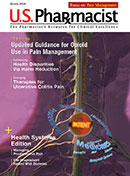Houston—Updated guidelines from the group Kidney Disease Improving Local Outcomes (KDIGO) recommend a slightly different approach for treating diabetes in patients with CKD.
The 2022 guideline endorses a “layered” plan of care, urging clinicians to begin with lifestyle interventions and first-line pharmacotherapy. “To this, other therapies are added to reduce the risk for adverse outcomes and to control risk factors for CKD progression and cardiovascular events, such as blood pressure, glycemia, and lipids,” according to the guidelines. “Although other guidelines have suggested viewing multifactorial therapy as ‘pillars’ of care, the KDIGO layered approach includes the preference for starting new treatments one at a time and then reassessing response and residual risk to further refine therapy.”
In a summary of the recommendations in the Annals of Internal Medicine, Baylor College of Medicine–led authors explained, “To maximize the tolerability of combination treatments, the guideline recommends the serial introduction of medications that improve intrarenal hemodynamics (such as RAS [renin-angiotensin system] inhibitors, SGLT2 [sodium–glucose cotransporter-2] inhibitors, MRAs [mineralocorticoid receptor antagonists], diuretics, and other antihypertensive medications). Ongoing monitoring is critical to ensuring that each patient ultimately receives the optimal therapeutic regimen.”
While prescribing therapies that can reduce the progression of CKD and lower the burden of cardiovascular disease, including heart failure, “healthcare providers should focus on preserving kidney function and maintaining well-being rather than replacing kidney function. The beneficial effects of SGLT2 inhibitors, ns-MRAs, and GLP-1 [glucagon-like peptide-1] RAs on CKD and cardiovascular disease provide an opportunity to achieve these goals and save millions of lives, but these therapies will only benefit patients with diabetes and CKD if implemented widely,” according to the article.
The KDIGO 2022 Clinical Practice Guideline for Diabetes Management in Chronic Kidney Disease is an update of the 2020 guideline. New evidence led to updating of recommendations in the chapters Comprehensive Care in Patients with Diabetes and CKD (and Glucose-Lowering Therapies in Patients With T2D [type 2 diabetes] and CKD). New evidence did not change recommendations on glycemic monitoring and targets, lifestyle interventions, and approaches to management, however.
The updated guideline includes 13 recommendations and 52 practice points for clinicians caring for patients with diabetes and chronic kidney disease.
“A focus on preserving kidney function and maintaining well-being is recommended using a layered approach to care, starting with a foundation of lifestyle interventions, self-management, and first-line pharmacotherapy (such as sodium–glucose cotransporter-2 inhibitors) demonstrated to improve clinical outcomes,” summary authors pointed out. “To this are added additional drugs with heart and kidney protection, such as glucagon-like peptide-1 receptor agonists and nonsteroidal mineralocorticoid receptor antagonists, and interventions to control risk factors for CKD progression and cardiovascular events, such as blood pressure, glycemia, and lipids.”
The content contained in this article is for informational purposes only. The content is not intended to be a substitute for professional advice. Reliance on any information provided in this article is solely at your own risk.






